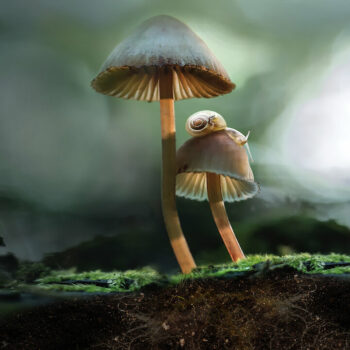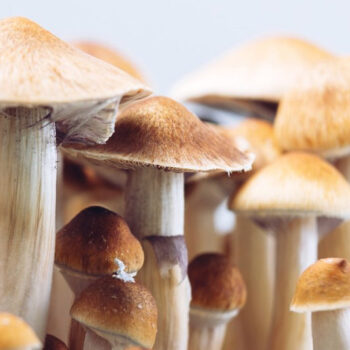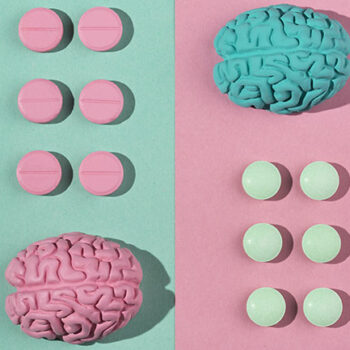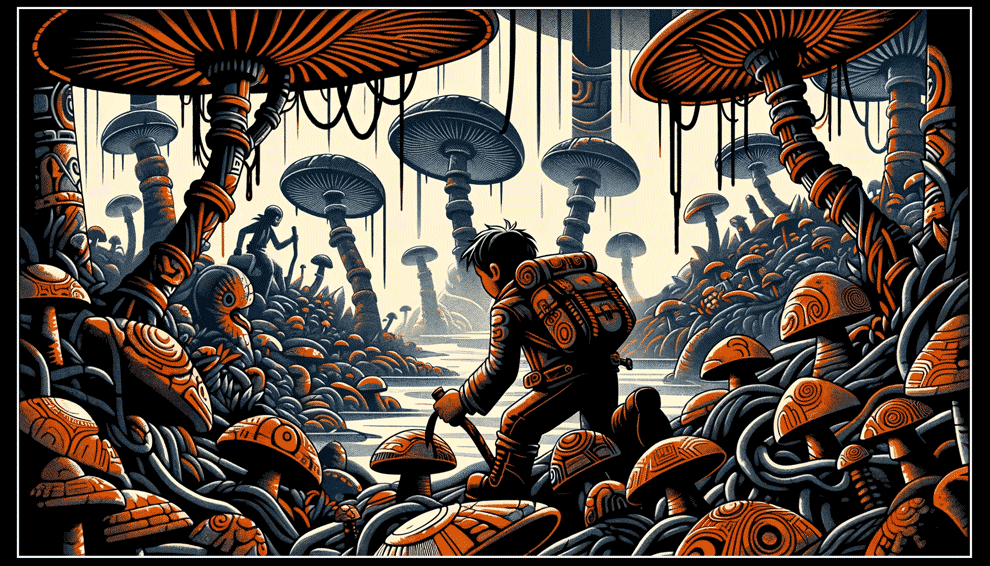
Table of Contents
The topic of psychotropic substances is often accompanied by understandable apprehensions. This concerns primarily revolve around three aspects: addiction, contraindications, and the risk of a Bad Trip. The best way to address these three themes is, first and foremost, through education.
Popular representations of the bad trip
Those who have watched movies like “Trainspotting” (Danny Boyle, 1996) or “Fear and Loathing in Las Vegas” (Terry Gilliam, 1997) may recall memorable scenes of impressive Bad Trips. The first one depicts a baby crawling on the ceiling in a highly distressing manner. The latter shows bar patrons transforming into menacing and lecherous dinosaurs. For a long time, cinema has provided us with vivid images of what a Bad Trip might entail. It’s perhaps these images from popular culture that partially fuel our fears of a mind-altering wave of terror.
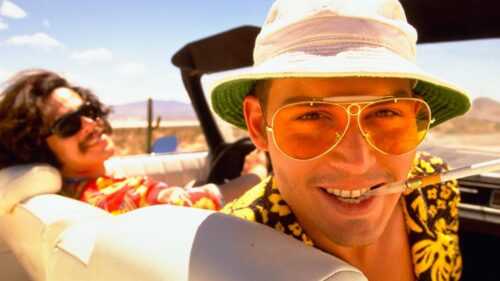
“Fear and Loathing in Las Vegas,” a guide on what not to do with hallucinogens
In any case, this aspect raises understandable concerns. Because, under certain conditions, navigating through the psychedelic waves may not be as calm as one might hope. However, the concept of a Bad Trip is often exaggerated when discussing magic mushroom ceremonies. This is because there is a crucial variable to consider.
An Emotional Breach
After psilocybin mushrooms ingestion, the brain experiences a real emotional upheaval. This is not mystical; it’s a perfectly well-understood neurochemical phenomenon. Psilocybin awakens serotonin receptors, a neurotransmitter involved in the regulation of emotions.
The resulting altered state of consciousness will amplify certain emotions, bring others to the surface, or dampen some. This breach allows for the processing of blockagesand acts on certain mental health problems such as depression or Post-Traumatic Stress Disorder (PTSD)..
The effects of a bad trip
The first signs of psilocybin consumption are typically euphoria, excitement, or even nausea. However, occasionally, one might experience a temporary feeling of panic. This is what is referred to as a mushroom bad trip.
Do not confuse a “Bad Trip” with an overdose. It describes an experience where the consumer feels catapulted into an altered reality, often filled with fear, paranoia, and distress. During a Bad Trip, visual and auditory hallucinations, along with waves of terror, may plague individuals.
They also experience a loss of control over their own thoughts and emotions. Although these states are temporary, they are likely to create an anxiety-inducing and unsettling atmosphere, hence their bad reputation.
Bad trips and psilocybin: a concept to be relativized
In general, negative psychological experiences due to the ingestion of cannabis or certain psychedelics are referred to as Bad Trips. When it comes to whether magic truffles can lead to psilocybin Bad Trips, the answer is yes, but it depends on the context.
Indeed, with psilocybin hallucinogenic mushrooms, there are times when one may have an intense emotional confrontation experience. Without preparation and a proper setting, this can be challenging and is not recommended. However, in an experienced setting such as a legal psychedelic retreat, the experience changes significantly (in the Netherlands or Oregon). It aligns more with a psychological journey rather than a nightmarish loss of control. This is referred to as a challenging experience.
Difference Between a Bad Trip and a Challenging Experience
If a bad trip can be compared to an unexpected storm, a psilocybin challenging experience would be more like a rough sea one chooses to navigate for a specific purpose.
Although the latter is filled with obstacles, it is not devoid of meaning or personal interest. A challenging experience, while challenging, is often infused with deep introspection. In the end, it can open the door to a new understanding and acceptance of oneself. Fear and discomfort are present but are perceived as challenges to overcome rather than an insurmountable threat, making this ordeal a potential path to personal and spiritual growth.
The bad trip, a traumatizing nightmare
A mushroom Bad Trip takes its travelers into the realm of irrational terror, with images reminiscent of horror films. Hallucination scenes can be highly impactful and diverse. Online testimonies often describe encounters with deceased individuals, killers, clowns, insults, or feelings of captivity.
A mushroom Bad Trip takes its travellers to the realm of irrational fear with impactful and varied sensations of anxiety. On the internet, you can read accounts mentioning deceased individuals, killers, clowns, insults, or impressions of being confined.
The bad trip occurs under very identifiable conditions: a noisy environment, people soliciting you, talking to you, touching you, an unfavourable psychiatric background, or mixing with alcohol or cannabis. Therefore, it is a related phenomenon that is more commonly found in recreational use. By definition, this use relies on spontaneity and gives little importance to preparation, introspection, or calm.
People who have experienced a Bad Trip are sometimes traumatised and talk about it months later, which is not the case with challenging experiences.
The Challenging Experience: A Natural Detachment
In contrast to a Bad Trip, the challenging experience is based on emotional resurgences. They are not horrifying but rather about sensations. For instance, psychedelic mushrooms can temporarily bring back feelings of loneliness, abandonment, or emotions related to past traumas. One of the recurring fears is the worry of being stuck in this state forever. It’s not easy, but the difference from a Psilocybin Bad Trip lies in the fact that the consumer will change their perspective on these different phenomena.
Faced with their own vulnerabilities, they will become capable of reshaping them. This new position is one of the keys to better self-understanding.
The magic mushroom bad trip is a very rare phenomenon in a professional setting since all the conditions of preparation, control, and safety are met. This is the very essence of a psychedelic retreat.
Ways to Avoid Difficulties
The challenging experience is not traumatizing, and it does not hinder one’s ability to explore new inner horizons. In fact, it can even accelerate the process. However, not everyone is willing to confront such an experience, even if it’s beneficial in the long run. In a retreat, the presence of an experienced support system is precisely the key to easily navigate through this state.
For some, the challenging experience is seen as an opportunity rather than a risk. According to observations made during our psilocybin ceremony sessions, only 1 out of 20 people (about 5%) goes through this type of experience. Due to the presence of facilitators, these challenging experiences are always productive and time-limited. Our methodology ensures a safe journey through the mind by setting several safety markers:

Enjoy a legal & intense experience in the Netherlands
A psychedelic retreat designed for best results: small group, one-to-one preparation, experimented facilitators, 1 year monthly integration & awesome place !
The “Set and Setting”
The mindset and environment in which someone consumes the substance are crucial. To promote the right mental state, engaging in preparatory work generally comes recommended. This involves discussions with the facilitators of a psychedelic retreat and introspection (or even therapy). The phenomenon is simple: the more you understand what you seek in the psychedelic experience and the more you are aware of the challenges in your life, the less likely the psychedelic journey is to become distressing.
The “set and setting” also relies on the availability of the guide or facilitator. In case of a difficult moment, a facilitator can completely change the nature of a challenging experience by offering support, listening, and presence. Interestingly, it often only takes a facilitator holding the participant’s hand to help them through the challenging experience.
The Facilitator’s Work Before the Psychedelic Trip
The facilitator plays a crucial role in navigating through a Bad Trip. Their work begins long before the ingestion of any psychoactive substance. A good facilitator is expected to create a safe and comfortable environment. To achieve this, they establish a trusting relationship between themselves and the participants, as well as within the group. This preparation work takes place during group meetings and one-on-one interviews.
In addition, facilitators take care to advise participants on the correct magic mushrooms dosage before they start tripping.
Setting Up the Psychedelic Trip
During the trip itself, the participant is shielded from external disturbances, completely focused on their internal states. They wear a blindfold and listen to specially curated evocative and inspiring music.
By their side, the team provides a stable and reassuring presence, switching between a role as passive observers and actively intervening when emotional waves become too intense. The finesse of a trip sitter lies in their ability to read the participants’ needs.
They must enable individuals to navigate their inner journey safely, offering empathetic support without judgment:
- They can help reframe negative thoughts and soothe fears.
- Sometimes, they guide the explorer to delve deeper into uncomfortable yet revealing territory.
- They consistently respect each person’s boundaries.
- They neither seek to understand nor interpret.
The facilitator is also there to assist in integrating the post-trip experience, allowing the participant to give meaning and structure to their internal discoveries. This integration aims to incorporate the changes into one’s daily life. This work is crucial to ensure that the insights gained during the journey are not lost in the vastness of the mind but rather anchored in the individual’s everyday reality.
Urban Legends Surrounding the Bad Trip
The fear of the unknown is something normal, so it’s common to come across myths and urban legends that shape the popular perception of bad trips.
The Point of No Return
One of the most common and persistent myths about mushroom bad trip is that of an individual who, after a tumultuous journey, never finds their way back to reality and remains trapped in a perpetual psychedelic state. This is incorrect, but we can explain this false belief.
In reality, only individuals with a history of severe psychosis, either personally or within their family, have a risk of enduring cognitive impairment. However, this group is both small and systematically excluded as a precaution in psilocybin retreats. This phenomenon has nothing to do with a Bad Trip, as it can occur in individuals with conditions like schizophrenia even in the absence of a challenging experience.
The Leap of Faith
Other stories recount users believing they can fly, leading them to engage in dangerous and sometimes fatal acts. It’s conceivable that risk-taking behaviors exist, as with alcohol or benzodiazepines, but they remain rare. In any case, for reasons of safety and personal growth, it is strictly recommended to consume psychedelics only in the presence of an experienced and trusted person.
We all need to exercise caution and vigilance without overshadowing positive or transformative experiences. Knowledge remains the best option for forming informed discussions. It allows each individual the possibility to make their own choices, whether they are in favor of psychedelics or not.
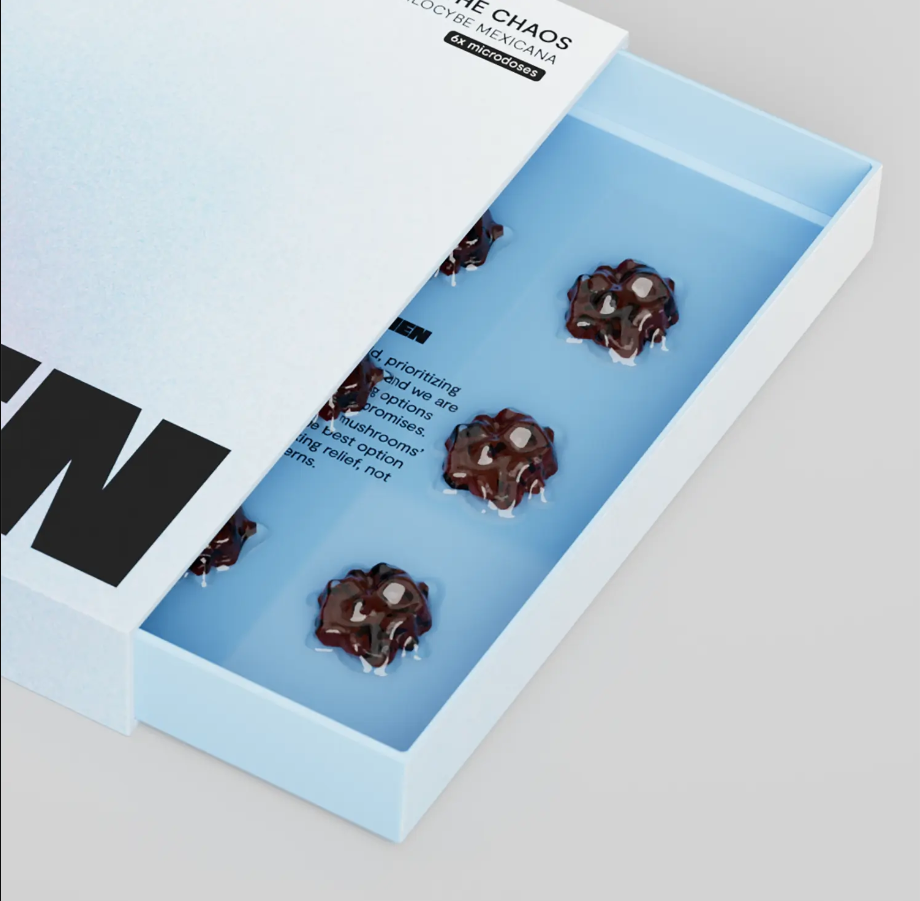
Want to start a microdosing session ?
Order the microdosing starter kit with 3 weeks of psilocybin truffles and a live english-speaking coaching session.
Try microdosing
FAQ about Bad-Trips
What is the risk of having a bad trip with magic mushroom?
It depends on the setup. Alone, at a party, or with insufficient preparation, the risk exists. Conversely, in a retreat or psychedelic therapy, everything is designed to minimise the risks of a bad trip.
What is the risk of having a bad trip during a retreat?
At the retreat location, it is very rare to have a bad trip. The reason is simple: all physical and psychological stress factors are eliminated so that participants can express their vulnerability without fear. The presence of facilitators allows any overly uncomfortable situation to be quickly resolved.
The presence of facilitators allows for a quick exit from any overly uncomfortable situation.
How can you help someone get out of a bad trip?
To assist someone in leaving a distressing trip, start by giving them fresh water to drink. If they’re willing, hold their hand and talk to them about very concrete things like their work, hobbies, family, or even food. After a few minutes, it’s possible to accompany them outdoors for a walk. However, while the person is under the influence of psychedelics, it’s important to avoid using anxiolytics, alcohol, or discussing traumatic experience.
How long can a psilocybin truffle bad trip last ?
In a festive context, a magic mushroom bad trip unfolds in two stages. First the purely hallucinatory effect lasts between 30 and 90 minutes. Then, there is a period of high emotional vulnerability that extends for 3 to 5 hours. In a controlled environment, a challenging experience lasts a maximum of 1 hour thanks to the support of facilitators.
Do people with a history of psychosis have a higher risk of experiencing a bad shroom trip?
Pharmacology research has not really studied this question. Nonetheless, caution is advised. Individuals suffering from a psychiatric disorder are cautioned not to attempt psychedelic experiences with magic truffles. This is to avoid unpleasant side effects.
What is the substance?
All psychoactive substances can cause a bad trip: LSD, cannabis, or Ayahuasca. The best method to avoid it is to have high-quality supervision. Moreover, it is important to choose a calm and relaxing setting, outside of a stressful period.
Is there a risk of a bad trip with microdosing?
In principle, no, because the dose of mushrooms is too low. It does not produce psychedelic effects and does not disturb self-awareness. However, be careful: mixing with medications or alcohol can amplify a magic truffles microdosing.
Sign up for our newsletter
to receive exclusive information on psychedelic news and our events.

